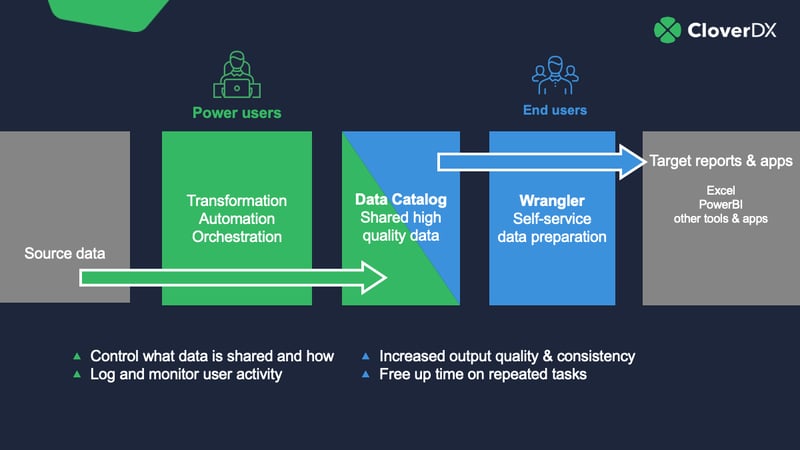Digital transformation refers to the process of using new technologies to accelerate business growth. But if these technologies aren't accessible to everyone at your business, it counters that benefit. That's because it slows your organization's ability to turn data into actionable outcomes.
Don’t just take our word for it, either. Ninety-seven percent of business leaders believe democratizing access to data and analytics across their organization is important to business success, according to a joint Harvard Business Review and Google Cloud report. Despite this, only 60% of these leaders believe their organization is very effective at giving employees access to data and analytics tools.
Here’s how you can achieve digital transformation via democratization of data.
How data democratization can drive your digital transformation
Data democratization is the practice of making data accessible and understandable to everyone, regardless of technical expertise.
Achieving this level of access is no easy feat, and you may need to rethink your digital transformation strategy. Your current tech stack, for instance, might not support safe access to data en masse. Without this, you’ll limit your organization’s potential to remain agile and adapt to emerging market trends.
What is data democratization? How to make data accessible to business users more easilyCurrently, it is often only experienced data teams that have the skills and expertise to leverage data analysis tools without it posing a risk to the wider organization. However, moving away from this ‘limited access’ mentality using data democratization can provide major benefits for your digital transformation efforts. These benefits include:
1. Reducing the burden on your IT team
Without the right tools in place, business users will need to repeatedly lean on IT teams to provide access to the data they need to make decisions. This burdens your IT team. Simple and tedious access request tasks cost time. This limits time spent on high-value and strategic IT initiatives.
If properly implemented, data democratization allows business users to access and engage with high-quality data directly, without relying on your IT team. Enabling business users to self-serve their data needs will free up your IT team to focus on their key priorities.
2. Improving the effectiveness of teams
According to a McKinsey survey, managers spend 37% of their time making decisions. Further, more than half of this time is deemed to be ineffective.
In today’s age of urgency, slow decision-making erodes a business’s competitiveness. In fact, the same survey discovered a typical Fortune 500 business squanders approximately 530,000 days of management time each year. This equates to about US$250 million per annum in wages.
One way to improve team effectiveness is to delegate decision-making. In order to achieve this, business users need direct access to data. This access enables them to make decisions without support. It also ensures they can produce accurate reports or provide useful forecasts that contribute to growth.
3. Preventing a data silo mentality
Gartner estimates that poor data quality costs businesses about US$12.9 million a year. But here’s the bit that counts: Even businesses with high-quality data can lose ground if that critical information is stuck in silos.
Having good data is no guarantee that your business will make good decisions. And if there’s equal frustration between your IT team and business users, it can widen the silo gap. By breaking down this data silo mentality, data democratization increases collaboration and improves your company culture.
4. Making processes more efficient
Without data democratization, inefficiency reigns supreme. Bloated and slow processes – as well as ineffective tools – make it extremely difficult for business users to conduct even the most basic data transformations. By making data democratization a priority, you can remove bottlenecks in your processes and limit friction between teams. The result? A more efficient, streamlined organization.
Accelerate your digital transformation and empower your business users
According to McKinsey, “the quality and speed of decision-making are both strongly associated with overall company performance”. That’s why 90% of business leaders believe achieving data democratization is now a priority for their business.
With data platforms like CloverDX, you can speed up your digital transformation by empowering business users to quickly turn data into actionable business outcomes. What’s more, you can do this while ensuring your IT team remains firmly in control of all data at the source.
CloverDX allows IT teams to share high-quality data in an accessible format with users across your organisation. CloverDX’s new Wrangler feature also allows business users to perform data transformations without the need for IT support or coding knowledge.
To learn more about how CloverDX can democratize data at your organization, book a demo today.










